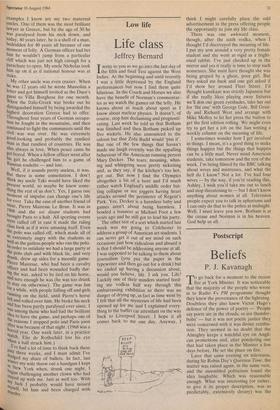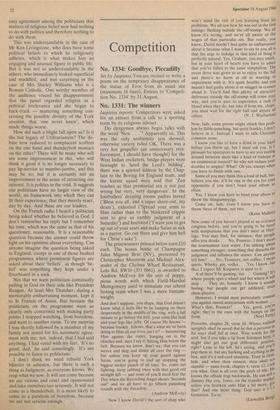Postscript
Beliefs
P. .1 Kavanagh
To go back for a moment to the recent fire at York Minster. It was noticeable that the majority of the people who wrote in to Radio 4's PM programme thought they knew the provenance of the lightning. Doubtless they also knew Victor Hugo's defence of the power of poetry — 'People say poets are in the clouds; so are thunder- bolts' — but it was not poetic justice they were concerned with it was divine retribu- tion. They seemed in no doubt that the Almighty keeps a watchful eye on Angli- can promotions and, after pondering one that had taken place in the Minster a few days before, He set the place on fire. Later that same evening on television, during Sir Robin Day's Question Time, the matter was raised again, in the same vein, and the assembled politicians found the idea laughable. Which was reasonable enough. What was interesting (or rather, to give it its proper description, was so predictably, extensively dreary) was the
easy agreement among the politicians that matters of religious belief now had nothing to do with politics and therefore nothing to do with them.
This was understandable in the case of Mr Ken Livingstone, who does have some political beliefs to which he religiously adheres, which is what makes him an engaging and unusual figure in public life. But it was not so understandable in the others, who immediately looked superficial and muddled, and was surprising in the case of Mrs Shirley Williams who is a Roman Catholic. One worthy member of the audience voiced his disappointment that the panel regarded religion as a political irrelevance and she began to hack-track — muttering something con- cerning the possible divinity of the York arsonist, that 'one never knew', which made things worse.
How did such a blight fall upon us? Is it the last legacy of Utilitariansim? The de- bate now reduced to complacent scoffers on the one hand and thunderbolt maniacs on the other? There will be many who will see some improvement in this, who will think it good it is no longer necessary to pay lip-service to mumbo-jumbo, and this may be so; but it is certainly not an improvement in the sense of attracting our interest. It is politics in the void. It suggests our politicians have no larger view of the world, no framework into which they can fit their experience; that they merely react, day by day. And these are our leaders.
On the French radio I heard a politician being asked whether he believed in God. I don't remember his reply but I remember his tone, which was the same as that of his questioner, reasonable. It is a reasonable question because the answer could throw light on his opinions about everything. Can anyone imagine the question being asked in England, except in one of those hushed programmes where prominent figures are asked about their 'beliefs', as though 'be- lief was something they kept under a floorboard in a sock.
Not that we want politicians continually pulling in God on their side like President Reagan. At least Mrs Thatcher, during a memorably embarrassing moment, kept it to St Francis of Assisi. But because the politicians on the programme were so clearly only concerned with making party points I stopped watching, from boredom, and went to another room. To my surprise I was shortly followed by a member of my family not noted for his automatic agree- ment with me; not, indeed, that I had said anything. I had voted with my feet. 'It's no good, dad,' he said consolingly. 'It's not possible to listen to politicians.'
I don't think we need rebuild York Minster in asbestos, but there is such a thing as Judgment, as everyone knows. We reap what we sow. It will not come because we are vicious and cruel and opinionated and take ourselves too seriously. It will not come as a thunderbolt. It is more likely to come as a paralysis of boredom, because we are not serious enough.







































 Previous page
Previous page